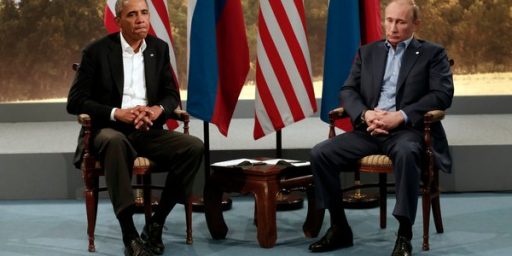Syrian Rebels Fighting Among Themselves
The prospect of a truly united Syrian opposition seems to be slipping away:
BEIRUT — Syria’s opposition coalition was on the verge of collapse Sunday after its president resigned and rebel fighters rejected its choice to head an interim government, leaving a U.S.-backed effort to forge a united front against President Bashar al-Assad in tatters.
The resignation of Moaz al-Khatib, a moderate Sunni preacher who heads the Syrian Opposition Coalition, climaxed a bitter internal fight over a range of issues, from the appointment of an interim government to a proposal by Khatib to launch negotiations with the Syrian regime.
His departure plunged the opposition into disarray at a time when the United States and its Western allies are stepping up their support for moderates opposed to Assad’s regime. Khatib’s coalition was expected to play a key role in identifying the recipients and channeling the assistance.
The coalition later issued a statement saying that its members had rejected Khatib’s resignation and had asked him to continue in a “management” capacity, leaving his status unclear. Though Khatib’s suggestion earlier this year that the opposition should negotiate with Assad’s regime met with fierce resistance from other coalition members, he is widely liked by many Syrians inside the country who desperately want to see an end to the violence.
There nonetheless seems to be little doubt that an initiative launched last fall in the Qatari capital, Doha, to create an inclusive and representative opposition body is falling apart, said Amr al-Azm, a history professor at Shawnee State University in Ohio who is Syrian and supports the opposition.
“The coalition is on verge of disintegrating,” he said. “It’s a big mess.”
The trigger for Khatib’s departure was the selection last week of Ghassan Hitto, a relatively unknown Syrian-born U.S. citizen, to head a proposed interim government. Khatib and his supporters had opposed the creation of an interim government at this time, as had the United States, whose diplomats argued against the move on the grounds that it created an unnecessarily divisive distraction from the goal of bringing down Assad’s regime, according to Syrian opposition members.
Hitto’s candidacy was backed, however, by the Syrian branch of the Muslim Brotherhood, and the push to install him as Syria’s first opposition prime minister was widely seen as an effort by the Brotherhood to claw back some of the influence lost when the original Syrian opposition body, the Syrian National Council, was absorbed into the wider Syrian coalition.
A dozen members last week suspended their membership in the coalition to protest Hitto’s appointment, and on Saturday, the defected general who heads the Supreme Military Council of the mainstream Free Syrian Army also rejected the choice, saying the rebels would accept only a “consensus” candidate for the job.
“We unequivocally declare that the Free Syrian Army, in all of its formations . . . conditions its support and cooperation on the achievement of a political agreement on the name of a prime minister,” Gen. Salim Idriss said in a videotaped statement.
Khatib’s resignation came hours after Qatar, which has close ties to the Brotherhood and also supported Hitto’s appointment, formally invited Hitto to represent Syria at an Arab League summit in Doha next week. Khatib referred only obliquely to the furor over Hitto’s appointment, saying he had resigned “so that I can work freely,” something that is not possible “within the official institutions.”
He also hinted at his frustration with the international community, which has failed to offer wholehearted support to the Syrian revolution even as individual countries compete to secure influence over the different factions opposing Assad’s regime.
“Who is ready to obey, [those countries] will support him,” he said. “And those who refuse to obey endure starvation and siege.”
As long as this continues, Assad will continue to have an advantage in this fight. Uniting is not a sufficient condition for victory, but it certainly is necessary.






Who’da guessed it? I suppose McCain will double down and say it is all Obama’s fault ’cause if only he had sent those glorious fighters for truth, justice, and the Syrian way guns, missiles, and bombs, all would be rainbows with pots of gold at the ends being pulled by unicorns.
The liberal media’s self-proclaimed “Arab Spring” appears yet again to be coming up smelling like dead bodies, and meet the new boss, same as the old boss, rather than smelling like roses. Go figure.
Difficult to see a happy ending here. Assad the Junior is just about as dictatorial as his father was, but with the added snafu of his country being two further decades into decline. Being aligned with Iran is like sleeping with the devil. Russia is a nasty mistress. There’s no oil in Syria, so Europe won’t care about it. Rambobama leads from behind.
This could turn into Rwanda, part deux. But with tanks and helicopters, rather than swords and spears. The U.S. left-wing neither will know about it nor care one iota — their concern chiefly is looking good at cocktail parties — but this is heading potentially for a historic human catastrophie. It’s a hard world out there. And being loopy sure doesn’t help matters.
@Tsar Nicholas:
The only people really pushing the idea of the Arab Spring as a transformative process towards peace, liberalisation and prosperity were either people with self interest in the region, or partisans interested in sniping at the political opposition, like you. It was always the hope, but the “Arab Spring” itself was never more than a coinciding series of revolts, some violent, some pacifist, against authoritarianism. From day one, everyone with working knowledge of the ME has preached patience and tempered expectations.
@Tsar Nicholas: I think this is more likely to turn into Lebanon, Part II. The number of fault lines in Syria is high.
Doug, ain’t you glad that Obama is in charge to keep us out of this rather than Secretary of State Bolton and Team Neo-con in the Romney Administration?
Greetings:
What was that that Fouad Ajami wrote ??? Something about those are the lands of “I against my brother; my brother and I against our cousin; and my cousin, my brother, and I against the stranger” ???